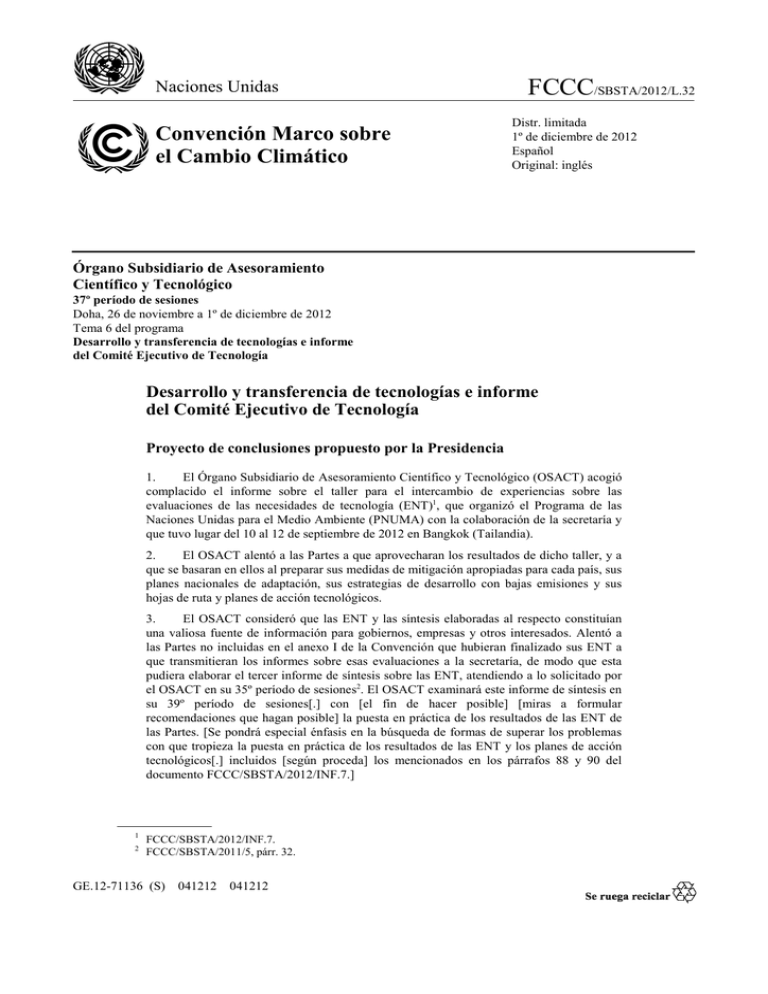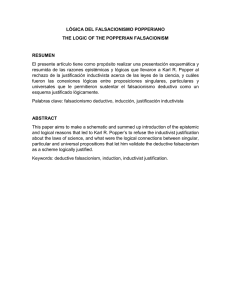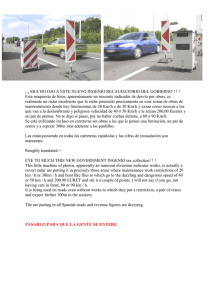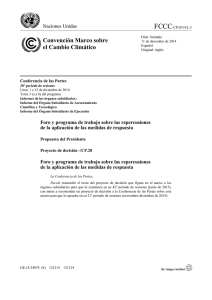Convención Marco sobre el Cambio Climático
Anuncio

Naciones Unidas Convención Marco sobre el Cambio Climático FCCC/SBSTA/2012/L.32 Distr. limitada 1º de diciembre de 2012 Español Original: inglés Órgano Subsidiario de Asesoramiento Científico y Tecnológico 37º período de sesiones Doha, 26 de noviembre a 1º de diciembre de 2012 Tema 6 del programa Desarrollo y transferencia de tecnologías e informe del Comité Ejecutivo de Tecnología Desarrollo y transferencia de tecnologías e informe del Comité Ejecutivo de Tecnología Proyecto de conclusiones propuesto por la Presidencia 1. El Órgano Subsidiario de Asesoramiento Científico y Tecnológico (OSACT) acogió complacido el informe sobre el taller para el intercambio de experiencias sobre las evaluaciones de las necesidades de tecnología (ENT)1, que organizó el Programa de las Naciones Unidas para el Medio Ambiente (PNUMA) con la colaboración de la secretaría y que tuvo lugar del 10 al 12 de septiembre de 2012 en Bangkok (Tailandia). 2. El OSACT alentó a las Partes a que aprovecharan los resultados de dicho taller, y a que se basaran en ellos al preparar sus medidas de mitigación apropiadas para cada país, sus planes nacionales de adaptación, sus estrategias de desarrollo con bajas emisiones y sus hojas de ruta y planes de acción tecnológicos. 3. El OSACT consideró que las ENT y las síntesis elaboradas al respecto constituían una valiosa fuente de información para gobiernos, empresas y otros interesados. Alentó a las Partes no incluidas en el anexo I de la Convención que hubieran finalizado sus ENT a que transmitieran los informes sobre esas evaluaciones a la secretaría, de modo que esta pudiera elaborar el tercer informe de síntesis sobre las ENT, atendiendo a lo solicitado por el OSACT en su 35º período de sesiones2. El OSACT examinará este informe de síntesis en su 39º período de sesiones[.] con [el fin de hacer posible] [miras a formular recomendaciones que hagan posible] la puesta en práctica de los resultados de las ENT de las Partes. [Se pondrá especial énfasis en la búsqueda de formas de superar los problemas con que tropieza la puesta en práctica de los resultados de las ENT y los planes de acción tecnológicos[.] incluidos [según proceda] los mencionados en los párrafos 88 y 90 del documento FCCC/SBSTA/2012/INF.7.] 1 2 FCCC/SBSTA/2012/INF.7. FCCC/SBSTA/2011/5, párr. 32. GE.12-71136 (S) 041212 041212 FCCC/SBSTA/2012/L.32 3 bis. [El OSACT era consciente de que seguía habiendo Partes que no podían participar en estos talleres sobre las ENT, e instó a esos países a que prosiguieran con sus actividades relacionadas con la transferencia de tecnología, entre otras cosas utilizando los manuales del PNUMA sobre las ENT y emprendiendo actividades ulteriores al respecto.] 4. De conformidad con la decisión 1/CP.16, párrafo 126, el OSACT y el Órgano Subsidiario de Ejecución examinaron el informe sobre las actividades y el desempeño del Comité Ejecutivo de Tecnología correspondiente a 20123, y recomendaron a la Conferencia de las Partes el texto del proyecto de decisión que figura en el anexo de las presentes conclusiones para que lo examinara y ultimara en su 18º período de sesiones. 3 2 FCCC/SB/2012/2. GE.12-71136 FCCC/SBSTA/2012/L.32 Anexo [Inglés únicamente] Report of the Technology Executive Committee [The Conference of the Parties, Recalling the relevant provisions of the Convention, in particular Article 4, paragraphs 1, 3, 5, 7, 8 and 9, Also recalling decisions 1/CP.16, 2/CP.17 and 4/CP.17, Further recalling that the Technology Executive Committee shall report, on an interim basis, to the Conference of the Parties, through the subsidiary bodies, on its activities and the performance of its functions, 1. Welcomes the report on activities and performance of the Technology Executive Committee for 2012,4 including the outcomes of its 2nd, 3rd and 4th meetings; 2. Also welcomes the rolling workplan of the Technology Executive Committee for 2012–2013 and the progress made by the Committee in advancing its implementation;5 3. Notes with appreciation the key messages of the Technology Executive Committee on enabling environments for and barriers to technology development and transfer, which are wide ranging and multi-dimensional and that further work on these issues are being undertaken by the TEC, as well as technology road maps and technology needs assessments, as contained in the report referred to in paragraph 1 above; 4. Recognizes that the work including the key messages of the Technology Executive Committee may inform Governments, relevant bodies under the Convention, and other stakeholders; 5. Notes the extensive consultations held by the Technology Executive Committee with relevant stakeholders and the submissions from such stakeholders that were received in response to the Committee’s calls for inputs on actions undertaken by accredited observer organizations that are relevant to the Technology Executive Committee in performing its functions; on ways to promote enabling environments and to address barriers to technology development and transfer; and on technology road maps and action plans; 6. Encourages the Technology Executive Committee to continue its consultations with relevant stakeholders under and outside the Convention; 7. Also encourages the Technology Executive Committee to continue to consult relevant institutional arrangements under the Convention, including the Adaptation Committee, the Standing Committee on Finance and the Board of the Green Climate Fund, and to initiate consultations with the advisory board of the Climate Technology Centre and Network as soon as it is established, in order to seek their views on and coordinate the proposed modalities of the Technology Executive Committee on linkages with other relevant institutional arrangements under the Convention;6 8. Requests the Technology Executive Committee to report on the outcomes of its consultations with other relevant institutional arrangements in its report on activities and 4 5 6 GE.12-71136 FCCC/SB/2012/2. FCCC/SB/2012/1, annex I. FCCC/SB/2012/2, annex. 3 FCCC/SBSTA/2012/L.32 performance for 2013, in order to inform the consideration and approval by the Conference of the Parties at its nineteenth session of the modalities of the Committee on linkages with other relevant institutional arrangements under and outside the Convention; 9. Notes that the Technology Executive Committee, with the assistance of the secretariat, in addition to the activities already planned in its rolling workplan for 2012– 2013 and consistent with its functions, will undertake specific follow-up activities in 2013 on enabling environments for and barriers to technology development and transfer, technology roadmaps and preparation of technical papers, as identified in its report referred to in paragraph 1 above, with a view to facilitating the effective implementation of the Technology Mechanism under the guidance of the Conference of the Parties; 10. Recognizes that technology needs assessments and their syntheses are a key information source for the work of the Technology Executive Committee in prioritizing its activities under the Technology Mechanism, and could be a rich source of information for Governments, relevant bodies under the Convention, and other stakeholders; 11. [Decides][Recognizes][Encourages] [that] the development and implementation of [process] technology needs assessments [outcomes] [should] [to] continue [and its outcomes should be implemented] and [become] integrated with related processes under the Convention, including [but not limited to] nationally appropriate mitigation actions, and national adaptation plans, and low emission development strategies; 12. Encourages the financial and business communities and funding sources under and outside the Convention to facilitate the funding for the implementation of technology needs assessment results. 13. [Recognizes that the issues of enabling environments for and barriers to access to environmentally sound technologies and transfer reducing the burden due to IPRs and recommending mechanisms which reward innovators and increase the dynamics of global innovation while helping parties who need such technologies, are wide ranging and multidimensional, and that further work on these issues would need to be undertaken by the Technology Executive Committee, the output of which should contribute to the deliberations among Parties on technology related matters under the Convention.]] 4 GE.12-71136






